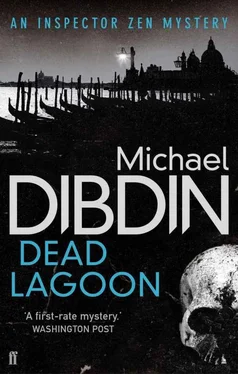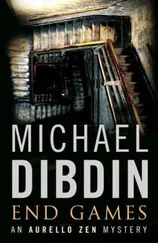Michael Dibdin - Dead Lagoon
Здесь есть возможность читать онлайн «Michael Dibdin - Dead Lagoon» весь текст электронной книги совершенно бесплатно (целиком полную версию без сокращений). В некоторых случаях можно слушать аудио, скачать через торрент в формате fb2 и присутствует краткое содержание. Жанр: Полицейский детектив, на английском языке. Описание произведения, (предисловие) а так же отзывы посетителей доступны на портале библиотеки ЛибКат.
- Название:Dead Lagoon
- Автор:
- Жанр:
- Год:неизвестен
- ISBN:нет данных
- Рейтинг книги:5 / 5. Голосов: 1
-
Избранное:Добавить в избранное
- Отзывы:
-
Ваша оценка:
- 100
- 1
- 2
- 3
- 4
- 5
Dead Lagoon: краткое содержание, описание и аннотация
Предлагаем к чтению аннотацию, описание, краткое содержание или предисловие (зависит от того, что написал сам автор книги «Dead Lagoon»). Если вы не нашли необходимую информацию о книге — напишите в комментариях, мы постараемся отыскать её.
Dead Lagoon — читать онлайн бесплатно полную книгу (весь текст) целиком
Ниже представлен текст книги, разбитый по страницам. Система сохранения места последней прочитанной страницы, позволяет с удобством читать онлайн бесплатно книгу «Dead Lagoon», без необходимости каждый раз заново искать на чём Вы остановились. Поставьте закладку, и сможете в любой момент перейти на страницу, на которой закончили чтение.
Интервал:
Закладка:
Saoner flinched.
‘What the hell are you talking about?’
‘I’m talking about the reshuffle he’s planning if he wins the election. Assuming the party does as well as expected, Dal Maschio’s whole political position will change completely. He’ll no longer be the leader of some fringe group, but mayor of one of the most important European cities, with a national and international profile and immense powers of patronage and persuasion. To deal adequately with that, he’s going to need a new set of men around him, men of vision and imagination, with quick wits and a nice television manner.’
Zen let his cigarette fall to the pavement and stepped on it carefully.
‘Mind you, I’m sure he’ll find some suitable role for people like you,’ he went on quickly. ‘Something which matches your talents and skills. Cristiana mentioned the possibility of a post with the department responsible for dredging the canals.’
‘This is all lies!’
Zen looked at him steadily and said nothing.
‘You’re making it all up!’ Saoner exclaimed in a tone of desperation.
‘You’re the ones who are making it up,’ Zen replied quietly. ‘You’ve made an inspirational leader out of an opportunistic mob-orator and you’ve remade the history of the city to fit in with his nonsense about a Venice cut off from the rest of Italy and Europe, inhabited by pure-blooded, dialect-speaking, one-hundred-per-cent Venetians.’
Saoner clenched and unclenched his hands in desperation.
‘That’s enough! I can’t bear any more. Why are you tormenting me like this?’
He started to walk away, mumbling to himself.
‘We were only trying to change things for the better. There’s nothing wrong with that, is there? I never meant to get mixed up in anything illegal. I don’t remember how that happened. I just don’t remember…’
He broke into a run, sprinting through the public gardens and across a bridge into a neighbourhood of turgid nineteenth-century apartment blocks like a chunk of Turin dropped down in the lagoon. Zen followed, calling out to him to stop. Down the broad, straight, eerily vacant moonlit streets the two men ran, their footsteps hammering on the flagstones. But Zen’s lungs were still raw from the cigarette he had just smoked, while Saoner was running with manic energy, like a man fleeing some unimaginable horror. As his quarry vanished over a bridge on to a grubby islet where the metal scaffolding of the football stadium reared up in the darkness, Zen gave up the chase.
Breathless and cold, he walked slowly back through the deserted streets of Sant’Elena and across the strip of scrubby pine forest to the vaporetto stop. An immense weariness overwhelmed him and he sank down on a bench. Scurries of wind plucked at his clothing like invisible fingers. He felt utterly despondent. He had done all he could do, and it had not been enough. He had lied to Tommaso in the most blatant and hurtful way about Dal Maschio’s opinion of him, but all to no avail. He had underestimated the hold a man like Dal Maschio could exercise over his followers, and the potency of the atavistic cravings from which he had concocted his ideological designer drugs.
The noise of an approaching ferry roused him from his stupor. Reluctantly he hauled himself to his feet and hobbled stiffly down the path to the landing-stage. Someone was already waiting there. Then Zen saw that the vaporetto was going to the Lido, not to the city. He was about to return to his bench when the waiting figure was caught in the boat’s lights as it nudged in alongside. It was Tommaso Saoner.
Zen hurried down the gangway just in time to climb aboard. Saoner had already gone below. The helmsman reversed engines to clear the landing-stage, then eased the craft out into the deep-water channel, passing astern of a car ferry also bound for the Lido. Zen edged round the deck until he came to a window with a view of the cabin. Tommaso Saoner sat bolt upright on his seat, staring straight ahead, seemingly oblivious to the tears streaming down his cheeks. Zen drew back into the darkness, wrapping his coat tightly around him. The wind had eased, but it was colder than ever. A shattered image of the moon tossed and bobbed on the lumpy seas, permuting its scattered fragments like a shaken kaleidoscope.
The wind dropped away as the ferry drew into the lee of the island. Zen waited to let Tommaso Saoner get off first, but it was not until the deck-hand went down to the cabin to rouse him that Saoner rose to his feet. At first he seemed unwilling to budge, but after a brief exchange with the mariner, who pointed out that the boat was going out of service, he climbed up the steps and went ashore.
Of all the topographical freaks in the lagoon, the Lido had always seemed to Zen the most disturbing. In summer, its vocation as a seaside resort lent the place an illusory air of normality, but in the bleak depths of February its true nature was mercilessly exposed. Here was a perfectly normal contemporary urban scene, with asphalt streets called Via this and Piazza that, complete with road signs and traffic lights. There was the usual jumble of apartments and villas, offices and hotels, the usual roar of cars and lorries, scooters, bikes and buses. Everything about the place was perfectly banal, in short, except that it was built on an isolated sandbar a few hundred metres wide between the shallow reaches of the lagoon and the open expanses of the Adriatic.
By the time Zen got ashore, Saoner was already fifty metres ahead, striding down the wide central avenue which led to the sea. Zen almost let him go, but at the last moment his curiosity got the better of him. A pair of headlights split the darkness at an intersection ahead. A car appeared and paused briefly before crossing the main street and disappearing to the right. It was immediately followed by a delivery van, three more cars, a lorry, and finally a milk tanker. Zen loped along the tree-lined pavement, trying to work out some rational explanation for this mysterious nocturnal convoy. Such was the state of his brain that it took him about a minute to realize that all the vehicles must have disembarked from the car ferry he had seen earlier. Satisfied, he scanned the street ahead to find that the figure he had been following had disappeared.
Despite his immense fatigue, he ran all the rest of the way to the huge piazza where the avenue joined the lungomare. During the summer this was the heart of the fashionable tourist area, but now the gardens looked drab and tatty and the wind made the trees shudder as though in pain. Zen looked all round, from the moth-balled hulk of the Grand Hotel des Bains to the gleaming strip of the boulevard skirting the beach where surf foamed dimly at the limit of vision.
‘Tommaso!’ he shouted.
The wind dismantled the word and flung the pieces away, but he called again and again.
‘Tommaso! Tommaso!’
He walked all around the piazza and along the road in both directions, but there was no sign of any other living soul. Fugitive traces of light were beginning to appear in the east before he finally gave up and turned away to begin the slow journey back to the city.
Winter sunlight, hard and brilliant, searched the grimy window and marked out a skewed square on the floor. Some vestige of childhood superstition made Aurelio Zen avoid setting foot in it as he went to and fro, collecting his belongings from all over the flat and returning them to the battered leather suitcase which had been the companion of his travels for almost thirty years.
The chore did not take long. He had brought only the bare minimum with him, and much of that he had never got around to unpacking in the first place. At a loss again, he sank down in a chair, gazing down at the glaring patch on the tiled floor. It was a beautiful day, everyone agreed, for the time of year. Overcome by exhaustion, Zen closed his eyes. The sun-struck square was still visible, branded on his retinas as a throbbing block of darkness.
Читать дальшеИнтервал:
Закладка:
Похожие книги на «Dead Lagoon»
Представляем Вашему вниманию похожие книги на «Dead Lagoon» списком для выбора. Мы отобрали схожую по названию и смыслу литературу в надежде предоставить читателям больше вариантов отыскать новые, интересные, ещё непрочитанные произведения.
Обсуждение, отзывы о книге «Dead Lagoon» и просто собственные мнения читателей. Оставьте ваши комментарии, напишите, что Вы думаете о произведении, его смысле или главных героях. Укажите что конкретно понравилось, а что нет, и почему Вы так считаете.











